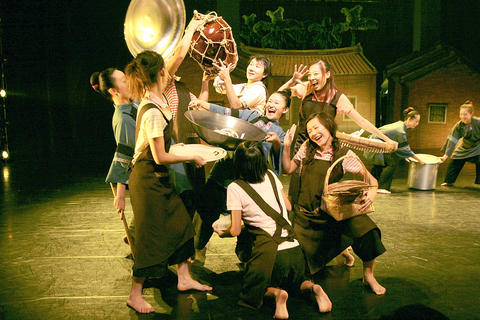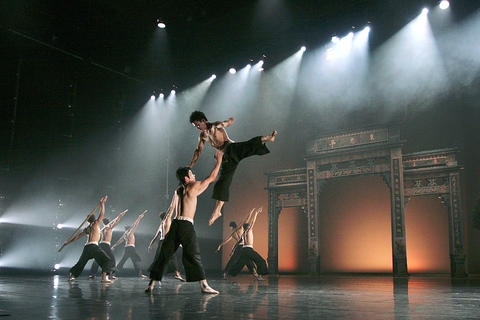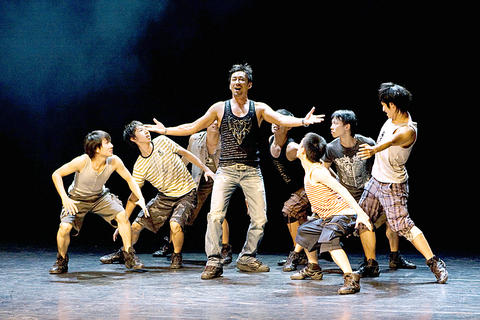Though Taiwan has no Broadway or West End, the popularity of musicals here is well established with recent foreign productions selling out at the box office. It's surprising, however, that Taiwan hasn't developed more indigenous musicals because the variety of operatic forms that are found on these shores, such as beiguan (北管), nanguan (南管) and especially Taiwanese folk opera (歌仔戲), all contain the necessary components of dance, song and acting necessary to pull off such a production.
If locally produced musicals are a rarity in Taiwan, the creators of My Daughter's Wedding (福春嫁女), beginning tonight at the National Theater, have gone one step further by producing a "Hakka musical."
The production "is supported by the council of Hakka Affairs and they are determined to promote Hakka culture and … make people more knowledgable about Hakka people's life," said Hong Kong stage director David Jiang (蔣維國).

PHOTOS: COURTESY OF LAI CHIH-SHENG
Neither the musical's director nor composer is Hakka, and the Taipei National University of the Arts (TNUA), hardly a bastion of Hakka culture, produces the musical. Aside from the language used in some of the scenes and a few scenes that employ Hakka cultural elements, what makes My Daughter's Wedding a Hakka musical?
The production is composed of over 200 performers - mainly TNUA students - including an orchestra, choir and a handful of Hakka musicians. Jiang says there are many parallels between My Daughter's Wedding and The Taming of the Shrew, Shakespeare's play on which the musical is based.
The Bard's comedy tells the story of two suitors competing to marry the daughter of a wealthy merchant. The father informs the two young men that his younger daughter cannot marry until her older, shrewish sister is married first (a preference Jiang says is very similar to "Chinese tradition"). The would-be grooms search for a suitable partner for the carping catch. My Daughter's Wedding employs the same conceit, but with a twist. Rather than interviewing a number of suitors for his eldest daughter, the father holds a contest, the winner of which takes home the bride.

PHOTOS: COURTESY OF LAI CHIH-SHENG
Three scriptwriters - Lin Jian-hua (林建華) and Wang Yo-hui (王友輝) working in Mandarin, and Huang Yu-shan (黃武山) working in Hakka - adapted the script into a combination of Mandarin and Hakka, with subtitles in Chinese and English. About half the production takes place in Taipei and is delivered in Mandarin.
The second part has the couple traveling to Meinong (美濃), the groom's hometown, where they are feted by the village women. Though this event has nothing to do with the original story, Jiang says it provides the perfect context to create a variety of dance movements to celebrate traditional Hakka culture.
My Daughter's Wedding tones down the overt battle between the sexes in The Taming of the Shrew.

PHOTOS: COURTESY OF LAI CHIH-SHENG
Composer Chien Nan-chang (錢南章), who received best musical work and best recording gongs at the 2005 Golden Melody Awards for his Buddhist Requiem and is a winner of the 2005 National Award for the Arts, uses operatic music and Hakka tonality for the score.
As the Hakka community was historically excluded from the mainstream artistic community, there aren't enough singers, dancers and actors necessary to pull the production off.
Jiang seems to implicitly understand this as he calls the production a work in progress or "a first draft."
"We don't have the tradition of Western-style musical in Asia ... . Therefore, it is difficult to find a performer who can sing, who can dance, who can act." Compounding the problem, many of the actors are unfamiliar with the Hakka language.
Why audiences should be exposed to a first draft, rather than a finished piece, especially considering the performance only runs for three days and not three months or three years, is unclear.
Still, in terms of the set, costume and choreography, the production has brought together some of Taiwan's most respected artists which should ensure that those who love musicals will not be disappointed by the lavish production.

May 18 to May 24 Pastor Yang Hsu’s (楊煦) congregation was shocked upon seeing the land he chose to build his orphanage. It was surrounded by mountains on three sides, and the only way to access it was to cross a river by foot. The soil was poor due to runoff, and large rocks strewn across the plot prevented much from growing. In addition, there was no running water or electricity. But it was all Yang could afford. He and his Indigenous Atayal wife Lin Feng-ying (林鳳英) had already been caring for 24 orphans in their home, and they were in

On May 2, Chinese Nationalist Party (KMT) Chairman Eric Chu (朱立倫), at a meeting in support of Taipei city councilors at party headquarters, compared President William Lai (賴清德) to Hitler. Chu claimed that unlike any other democracy worldwide in history, no other leader was rooting out opposing parties like Lai and the Democratic Progressive Party (DPP). That his statements are wildly inaccurate was not the point. It was a rallying cry, not a history lesson. This was intentional to provoke the international diplomatic community into a response, which was promptly provided. Both the German and Israeli offices issued statements on Facebook

Even by the standards of Ukraine’s International Legion, which comprises volunteers from over 55 countries, Han has an unusual backstory. Born in Taichung, he grew up in Costa Rica — then one of Taiwan’s diplomatic allies — where a relative worked for the embassy. After attending an American international high school in San Jose, Costa Rica’s capital, Han — who prefers to use only his given name for OPSEC (operations security) reasons — moved to the US in his teens. He attended Penn State University before returning to Taiwan to work in the semiconductor industry in Kaohsiung, where he

Australia’s ABC last week published a piece on the recall campaign. The article emphasized the divisions in Taiwanese society and blamed the recall for worsening them. It quotes a supporter of the Taiwan People’s Party (TPP) as saying “I’m 43 years old, born and raised here, and I’ve never seen the country this divided in my entire life.” Apparently, as an adult, she slept through the post-election violence in 2000 and 2004 by the Chinese Nationalist Party (KMT), the veiled coup threats by the military when Chen Shui-bian (陳水扁) became president, the 2006 Red Shirt protests against him ginned up by